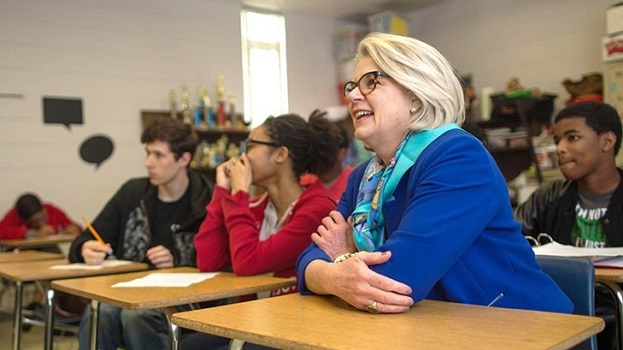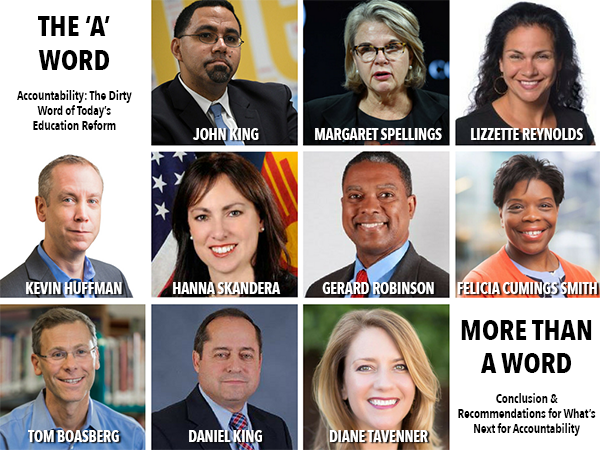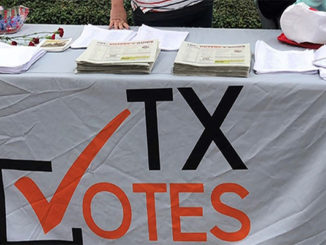
This interview is part of The ‘A’ Word series, produced in partnership with the Bush Institute to examine how “accountability” became a “dirty word,” and what can and should be done going forward to ensure accountability withstands the test of a bad reputation. The interviews were conducted over the telephone, transcribed, and edited for clarity and length. The same questions, or types of questions, were put to each participant to see what they thought independently and collectively about accountability. Their answers will take the reader into the inner workings of schools, the intricacies of the politics of education, and the ways in which campuses can better serve students. Click through the grid below to read other ‘A’ Word conversations.
From 2005 to 2009, Margaret Spellings served as the U.S. secretary of education, where she had responsibility for implementing No Child Left Behind. The bipartisan initiative, which President George W. Bush signed into law in 2002, provided greater accountability for the education of 50 million U.S. public school students. From 2001 to 2005, the University of Houston graduate was chief domestic policy advisor for President Bush.
Spellings worked for President Bush both before and after his time in the White House. She served as a senior advisor to President Bush when he was governor of Texas, and she was named president of the George W. Bush Presidential Center in 2013. In 2016, Spellings was appointed president of the University of North Carolina System.
In this ‘A’ Word interview, Spellings recalls that before school accountability gained traction in No Child Left Behind, it was all too easy for schools to hide the performances of low-achieving students, many of whom came from disadvantaged homes and minority families. Today, she emphasizes, we need to remember why it is so important that all students achieve their potential. Nothing less than the health of our democracy is at stake.
Spellings also frankly discusses the do-overs she would have liked with NCLB, which include getting data to teachers in a more timely way. And, as she points out, resources need to be expanded and aligned to meet the challenges facing America’s schools.
Anne Wicks & William McKenzie: Let’s start with these basic questions: How do you define accountability, and has that changed over time?
Margaret Spellings: I define accountability as the process by which we tell ourselves the truth about achievement for all students and hold those actors in the system — adults, parents, all stakeholders — to some level of responsibility around those results.
Has that definition changed over time?
I think there’s emphasis — and this is an observation; this isn’t my preference necessarily — to make those accountable broader than in times past. Previously, we thought of the school as the primary focal point of accountability — the teacher, the campus, the principal, the superintendent, the district. Now we have spread it out, where accountability includes parents and others. Part of that is because accountability’s gotten so anemic.
We will get to the anemic part in a minute, but how did you use accountability principles or concepts at the Education Department, in a policymaker role at the White House, or even when you were working with George W. Bush as governor?
I used them to make fact-based decisions about needs, investments, urgencies, and personnel changes. I used them as a primary driver of change that could be defended and was fact-based. That is accountability’s primary utility. You can’t solve a problem that you don’t diagnose correctly, fairly, accurately, and comparably.
Were these concepts applicable when Texas was rewriting its education code while George W. Bush was governor?
Definitely, and they still are. I famously said that the tenets of No Child Left Behind were like Ivory soap. They are 99 percent pure. That’s still true in the sense that these are tried and true management principles that are good for any organization. They stand the test of time.
The fact that the mandate of accountability is now more decentralized, and the aperture is open on all manner of things that can count and don’t count, the wheels are off. But the idea that you measure something, you diagnose it, and you invest resources around it, is tried and true. That’s 99 percent pure.
You toured the country a lot as education secretary. How did you see these principles making a difference in the lives of students and their schools?
Accountability principles allowed us to put a bright light on the underachievement and under-resourcing of poor, minority, and first-generation students, those who had been, quote-unquote, left behind, including special education students.
Accountability allowed us to expose and shame. I probably shouldn’t use that harsh of language, but that’s what motivated people. I used to say we tried the “put the money out and hope for the best” approach for a long time. It’s not that people were full of ill will. It’s just that it didn’t matter. The performance of low socioeconomic kids just didn’t matter that much.
The News & Observer did a three-day series this year that described how gifted high-performing minority students in Raleigh and Charlotte are often channeled into low-level courses. The reason they can do a report like that is because there’s some level of measurement and accountability. But when it’s a “hope for the best” strategy, poor and minority kids will get left behind. Even people who hate No Child Left Behind and have strong reservations about accountability recognize that it forced us to focus on low-income, poor, and minority kids like we never had before.
You were saying earlier that accountability has become anemic. How so?
The whole framework around what accountability is at a federal level is gone. There is this crazy quilt of accountability systems across the country, with lots of local latitude to maneuver the fine print. This is harsh language, but there is no central authority to monitor any of that and keep them honest. Left to their own devices, they’re going to go easy on themselves. That’s human nature.
Beyond the human nature part, what worries you about states getting this type of responsibility?
Lots of superintendents and state chiefs would say this: They love to blame that federal government, that Margaret Spellings for making them do something, for keeping them honest. It’s the “devil made me do it” kind of thing because the politics are vigorous at the local level to say everybody’s doing great and all is well. That is so for a variety of reasons.
That is why having that stopper at the federal level is important. When that is absent, it’s easy for the boulder to drift down the hill.
Were you fighting all the time for these principles while passing accountability reforms in Texas or No Child Left Behind in Washington? Or was it easier to develop a consensus then?
There was more consensus because people didn’t know how stark the finding accountability was going to be. On its face people would say, “OK, that makes sense. Let’s measure the kids. Let’s see how they’re doing. Let’s resource around the issues, and the tide will turn.”
It did, but then accountability started to pinch. We started to expose things like, the best teachers were in the easiest places. The exposure made people uncomfortable.
In the early days it was pretty easy to do accountability because nobody had done it before. That was definitely true at the enactment of No Child Left Behind.
I’ll never forget the day [then–GOP House Education and the Workforce Committee Chairman] John Boehner and [then–ranking Democrat on the House Education and the Workforce Committee] George Miller, neither of whom had ever had any experience with accountability like we had in Texas, put special-education kids in the bill. They wanted everybody in the system. When George Bush was the one pushing accountability, and people were trying to raise the bar for you, we obviously bought in.
The bar was high, and that made the system hard to sustain. Even Jeb Bush, the president’s own brother, railed against it.
At what point did the pushback start growing and lead to a different consensus?
I would say this to his face: It happened when the Obama administration started making it more personal to teachers and pay systems. Opponents hated it when it was just kids and it was school labeling. But when it got time to educators’ own pay — particularly when we had such limited experience with pay-for-performance — that’s when the wheels came off.
You all might disagree with that, but I think that’s when it really frayed.
Where else do you think we may have gone wrong in building broad support for accountability?
The information did not have the necessary utility for managers. The data was too slow, so it didn’t help them improve the enterprise enough. If we had a do-over, we would somehow make the information more readily available to teachers and principals in real time so they could do something with it.
The number two thing I would do over is a better job training school leaders on how to use accountability data to be their friend.
The too-much-testing complaints that then ended up getting into the local mix also helped derail accountability. As you all know, No Child Left Behind requires a test in two subjects once a year in grades three through eight, and once in high school. Of course, schools and states and localities went far beyond that, and I think it’s come to no good end.
So we would have done a better job thinking about right-sizing the assessment, and how much is too much.
As we go forward, how do we reclaim this ground?
We need leadership. Whatever you want to say about it, George Bush and Ted Kennedy led on this — period, paragraph. And they talked about it a lot.
Frankly, President Bush brought his fellow Republicans into a place that they didn’t want to go and frankly have not stayed in. We had a coalition of the civil rights and business communities that is not as robust as it once was. The unions and the far right are ascendant and for their own reasons are not for this kind of approach.
If we’re going to regain this ground, we have to regain some of the moral imperative. People cared that black and brown children were being undereducated. I’m not sure that’s true anymore. So, what is the narrative that will sell this go-around? Is it about economic development? Human capital? Doing this because it’s the right thing, I think, has fallen to the end of the list.
You were talking about doing a better job getting information to principals and teachers. Technologies are obviously changing very fast. How do you see these developments getting data to people in a more real-time way than when No Child Left Behind was rolled out 15 years ago?
Yes, that is helpful. And Common Core is helpful because you can make comparisons that we couldn’t before. The territory is more fertile than it was.
One of the major contributions of No Child Left Behind was that we created a whole infrastructure that was literally nonexistent. If I remember correctly, something like seven states, if that, had annual assessment when we got into office in 2001.
We’re going into a new era where states have more authority over accountability systems. What should we expect of state leaders, district leaders, and school board members when it comes to ensuring all students have the opportunity to learn at the right grade level?
What we should expect and what we might expect might be different things. We should expect them to be very technically attuned to the details of all the wonkery: the definition of the school year and size, exemptions, confidence intervals, etc. It’s a fool’s errand to expect that level of understanding is in place, but that’s what it will take for this to work.
Now that you are in higher education, what should universities do to prepare teachers and principals?
We are about to start doing some things here in North Carolina. One is making sure our colleges of education are teaching teachers to do the best work possible, using what we know about reading and research, for example.
Number two, we need to make sure there’s alignment between the K-12 curriculum and what’s happening in colleges of education. We do a very poor job of that. We also need to build in some consequences for the colleges of education to do that. Right now, other than doing the right thing, there’s no incentive whatsoever for colleges of education to do any of that.
Somebody with a 98.6 temperature is particularly going to get hired in growing states like North Carolina and Texas. The fact that they’re not set up to be effective when they get into the classroom is sort of immaterial. Growing states just need more teachers to fill their classrooms.
What do you look for in terms of states having a solid accountability system?
A checklist of what good accountability looks like includes high standards; measurement systems that are valid and reliable; exemption rates that are not excessive; professional development that is aligned; and timely data. And then do a yardstick that shows how state accountability systems match up to it.
We need to make this as simple as possible, like giving people a grade. I’d like to see a report card on who has real and meaningful accountability. We need to pull back the veil on accountability.
Along these lines, what do you worry about most with states having this new authority under ESSA?
I worry that we see a real retreat in achievement for poor and minority kids, that they get lost in the shuffle. We’re already seeing that. We’re seeing that in Texas.
What uncomfortable truths in education have we been unwilling to address?
Resourcing around the problems. The worst teachers are in the hardest schools, the best teachers are in the easy schools. We have college-ready curriculum going on in big-time ways in well-resourced suburban schools, and hardly any college-ready curriculum in our disadvantaged communities.
I used to tell the story in my D.C. days that if you were at Langley [High School in McLean, Virginia], you could have 27 AP classes, but if you were at an inner-city D.C. high school, maybe there were 2 or 3 AP classes. And then we complained that the kids were not college-ready. We have not put our money where our mouths are on resourcing the problems.
What is at stake for us as a country to get this right?
Everything. Our economic viability, our civic democracy — not to be too hyperbolic, but our way of life.
If that much is at stake, why do you think it’s so hard to translate the principles of accountability into a greater public understanding?
Because it’s kind of a slow burn, easy-to-mask problem, and the soft bigotry of low expectations are alive and well. People don’t expect poor and minority kids to achieve at high levels. It’s just not the standard.
If half the school lunches served in the cafeteria were tainted, people would be on fire. If they had trans fats, they’d be on fire. The fact that half the kids can’t read, nobody gives a damn.
Are the achievement gaps, and the resource gaps, solvable? What will it take?
It is absolutely solvable. But we are not really serious about solving this problem. If we were, we could do it.
What will it take?
It would take all the obvious things, such as sending your best people to do the hardest work, and paying them for doing it.
Is there anything that we haven’t asked you that you want to capture?
This may seem gratuitous, and he would hate it if I was doing this, but President Bush deserves a lot of credit for engendering support around and enacting a law that affected more than 50 million schoolchildren for more than a decade.
The key principles of it are still in place, which are annual assessments and disaggregated data. If I’m hopeful about anything, I’m glad that [Senate Committee on Health, Education, Labor and Pensions Chairman] Lamar Alexander was able to keep those things in place in the Every Student Succeeds Act, along with the inclusion of special education students and English language learners in a real way in accountability systems. These give us the tools to reinvent this for a new era when we’re ready.
(Click through the grid below to read each leader’s take on accountability)

Anne Wicks is director of education reform at the George W. Bush Institute.
William McKenzie is editorial director at the George W. Bush Institute.



